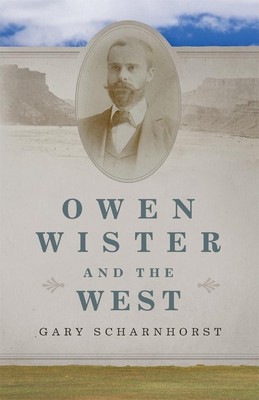
- We will send in 10–14 business days.
- Author: Gary Scharnhorst
- Publisher: University of Oklahoma Press
- ISBN-10: 0806146753
- ISBN-13: 9780806146751
- Format: 14.2 x 21.8 x 2.5 cm, kieti viršeliai
- Language: English
- SAVE -10% with code: EXTRA
Reviews
Description
Westerns are rarely only about the West. From the works of James Fenimore Cooper to Gary Cooper, stories set in the American West have served as vehicles for topical commentary. More than any other pioneer of the genre, Owen Wister turned the Western into a form of social and political critique, touching on such issues as race, the environment, women's rights, and immigration. In Owen Wister and the West, a biographical-literary account of Wister's life and writings, Gary Scharnhorst shows how the West shaped Wister's career and ideas, even as he lived and worked in the East.
The Virginian, Wister's claim to literary fame, was published in 1902, but his writing career actually began in 1891 and continued for twenty-five years after the publication of his masterpiece. Scharnhorst traces Wister's western connections up to and through the publication of The Virginian and shows that the author remained deeply connected to the American West until his death in 1938. Like his Harvard friend Theodore Roosevelt, Wister was the sickly scion of an eastern family who recuperated in the West before returning to his home and inherited social position. His life story is punctuated with appearances by such contemporaries as Frederic Remington, Rudyard Kipling, and Ernest Hemingway. Scharnhorst thoroughly discusses Wister's experiences in the West, including a detailed chronology of his travels and the writings that grew out of them. He offers numerous insights into Wister's adroit use of sources, and provides revealing comparisons between Wister's western works and the writings of other authors treating the same region. The West, Scharnhorst shows, was the crucible in which Wister tested and expressed his political opinions, most of them startlingly conservative by present standards. Yet The Virginian remains the template for the western novel today. More than any other Western writer of the past century and a half, Wister's career merits resurrection.EXTRA 10 % discount with code: EXTRA
The promotion ends in 23d.14:37:25
The discount code is valid when purchasing from 10 €. Discounts do not stack.
- Author: Gary Scharnhorst
- Publisher: University of Oklahoma Press
- ISBN-10: 0806146753
- ISBN-13: 9780806146751
- Format: 14.2 x 21.8 x 2.5 cm, kieti viršeliai
- Language: English English
Westerns are rarely only about the West. From the works of James Fenimore Cooper to Gary Cooper, stories set in the American West have served as vehicles for topical commentary. More than any other pioneer of the genre, Owen Wister turned the Western into a form of social and political critique, touching on such issues as race, the environment, women's rights, and immigration. In Owen Wister and the West, a biographical-literary account of Wister's life and writings, Gary Scharnhorst shows how the West shaped Wister's career and ideas, even as he lived and worked in the East.
The Virginian, Wister's claim to literary fame, was published in 1902, but his writing career actually began in 1891 and continued for twenty-five years after the publication of his masterpiece. Scharnhorst traces Wister's western connections up to and through the publication of The Virginian and shows that the author remained deeply connected to the American West until his death in 1938. Like his Harvard friend Theodore Roosevelt, Wister was the sickly scion of an eastern family who recuperated in the West before returning to his home and inherited social position. His life story is punctuated with appearances by such contemporaries as Frederic Remington, Rudyard Kipling, and Ernest Hemingway. Scharnhorst thoroughly discusses Wister's experiences in the West, including a detailed chronology of his travels and the writings that grew out of them. He offers numerous insights into Wister's adroit use of sources, and provides revealing comparisons between Wister's western works and the writings of other authors treating the same region. The West, Scharnhorst shows, was the crucible in which Wister tested and expressed his political opinions, most of them startlingly conservative by present standards. Yet The Virginian remains the template for the western novel today. More than any other Western writer of the past century and a half, Wister's career merits resurrection.

Reviews